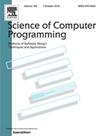Analyzing student perceptions and behaviors in the use of an engaging visualization dashboard for peer code review activities
IF 1.4
4区 计算机科学
Q3 COMPUTER SCIENCE, SOFTWARE ENGINEERING
引用次数: 0
Abstract
Background and context
Traditional learning management systems often fail to sustain student motivation in computer science education, where consistent practice is crucial for skill development. This necessitates specialized tools that better support technical learning processes, foster engagement, and enable timely interventions for struggling students.
Objectives
This study introduces and evaluates a dashboard module integrated into peer code review activities within an "Object-Oriented Design Laboratory" course. The research analyzes comprehensive peer code review data collected through this dashboard to examine student review behaviors and identify at-risk students through behavioral indicators.
Method
A mixed-methods approach compared an experimental group (n = 75) using the assessment dashboard against a control group (n = 78) without dashboard access. Both cohorts received identical instructions over 17 weeks. Data collection included peer code review processes, programming exam results, and student surveys to analyze review behaviors and perceptions of the dashboard.
Findings
Students with dashboard access demonstrated significantly improved engagement and self-awareness in the peer code review activity, along with measurable performance gains. Instructors benefited from more efficient monitoring capabilities across peer code review activities.
Implications
Dashboard systems enhance metacognitive awareness through self-reflection and interaction monitoring, showing particular promise for programming education. These systems improve learning outcomes and instructional effectiveness by providing visual feedback that helps students track progress and identify improvement areas while giving instructors valuable insights into engagement patterns and learning behaviors.
分析学生的看法和行为,使用引人入胜的可视化仪表板进行同行代码审查活动
背景和背景传统的学习管理系统往往不能在计算机科学教育中维持学生的积极性,而在计算机科学教育中,持续的实践对于技能发展至关重要。这就需要专门的工具来更好地支持技术学习过程,促进参与,并为困难学生提供及时的干预。本研究介绍并评估了“面向对象设计实验室”课程中集成到同行代码审查活动中的仪表板模块。该研究分析了通过该仪表板收集的全面的同行代码审查数据,以检查学生的审查行为,并通过行为指标识别有风险的学生。方法采用混合方法将使用评估仪表板的实验组(n = 75)与不使用仪表板的对照组(n = 78)进行比较。两组患者在17周内接受了相同的指导。数据收集包括同行代码审查过程、编程考试结果和学生调查,以分析审查行为和对仪表板的看法。有仪表板访问权限的学生在同行代码审查活动中表现出显著提高的参与度和自我意识,以及可衡量的性能收益。讲师从跨同级代码审查活动的更有效的监视能力中受益。仪表板系统通过自我反思和交互监测来增强元认知意识,在编程教育方面表现出特别的前景。这些系统通过提供视觉反馈来提高学习效果和教学效率,帮助学生跟踪进度并确定改进的领域,同时为教师提供参与模式和学习行为的宝贵见解。
本文章由计算机程序翻译,如有差异,请以英文原文为准。
求助全文
约1分钟内获得全文
求助全文
来源期刊

Science of Computer Programming
工程技术-计算机:软件工程
CiteScore
3.80
自引率
0.00%
发文量
76
审稿时长
67 days
期刊介绍:
Science of Computer Programming is dedicated to the distribution of research results in the areas of software systems development, use and maintenance, including the software aspects of hardware design.
The journal has a wide scope ranging from the many facets of methodological foundations to the details of technical issues andthe aspects of industrial practice.
The subjects of interest to SCP cover the entire spectrum of methods for the entire life cycle of software systems, including
• Requirements, specification, design, validation, verification, coding, testing, maintenance, metrics and renovation of software;
• Design, implementation and evaluation of programming languages;
• Programming environments, development tools, visualisation and animation;
• Management of the development process;
• Human factors in software, software for social interaction, software for social computing;
• Cyber physical systems, and software for the interaction between the physical and the machine;
• Software aspects of infrastructure services, system administration, and network management.
 求助内容:
求助内容: 应助结果提醒方式:
应助结果提醒方式:


